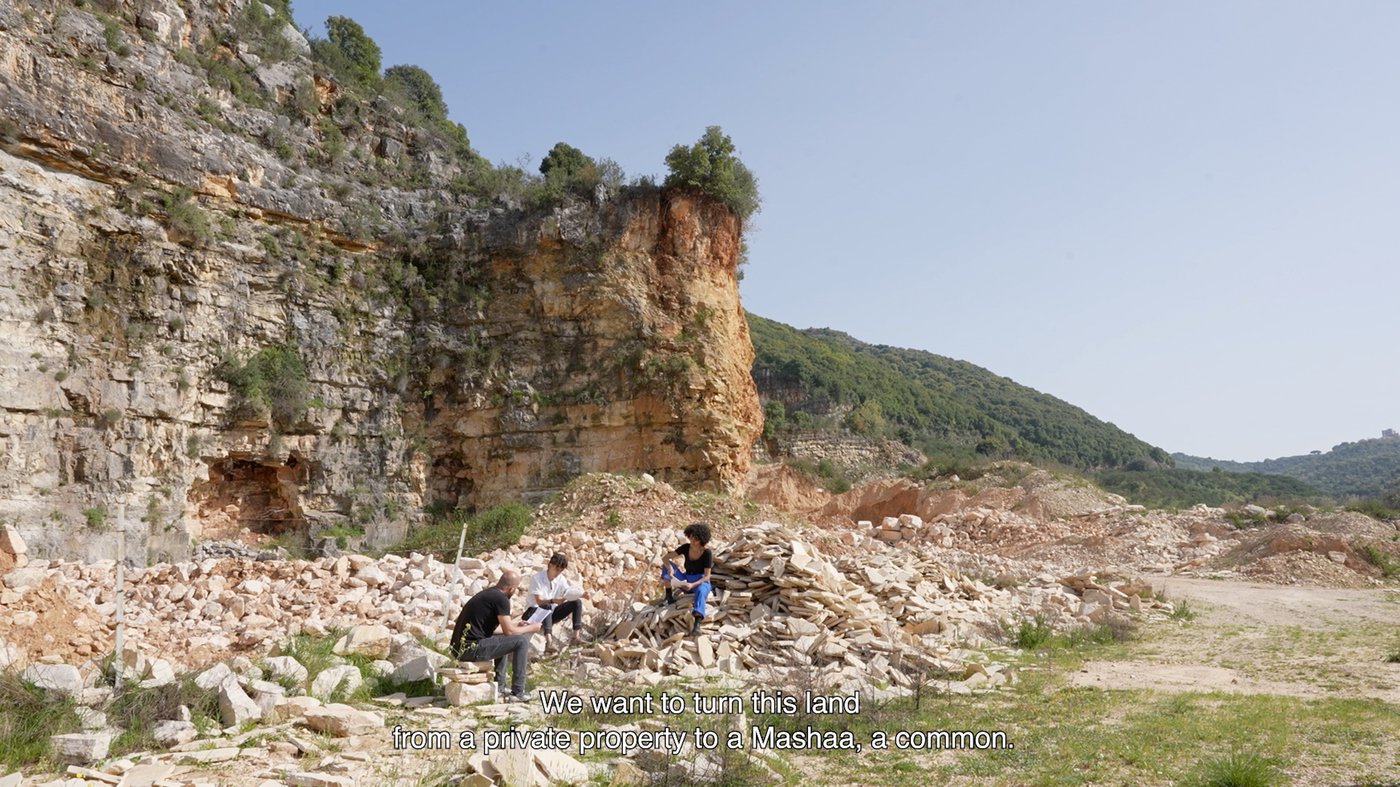Invitation to the Defense of Marwa Arsanios
The PhD-in-Practice program at the Academy of Fine Arts Vienna kindly invites you to the defense of Marwa Arsanios´ dissertation project Matter of Alliances the Metabolic Image of Land Struggle.
The Examination Panel is made up of: Janine Jembere (chair), Anette Baldauf and Renate Lorenz (supervisors), and Bojana Kunst (external appraiser, Justus Liebig University Giessen).
Abstract
The thesis "Matter of Alliances, The Metabolic Image of Land Struggle" is structured around three specific relationships to land that shake the state apparatus and its judiciary system that sanctifies private property. These are three cases of communalization of land led by grassroot anti-colonial and ecological feminist movements and organizations. While mapping out the different practices of communalization processes, that depart from seed guarding, a reappropriation through armed struggle and a legal battle, one notices that these three forms of political organizing around land, whether anarchic, party politics or legal intervention, can complement each other to a certain extent. Each context and geography shape its own resistance strategy, but from Iraqi Kurdistan, to Northern Syria, to the North of Lebanon, the South of Tolima in Colombia there is a similar purpose; that of de-privatization, collectivization of land and ultimately communalization. As an artist I have had a long-term engagement with each of the commune, movement and cooperatives that are mentioned in the thesis; Whether as a member and founder or as a mediator, translator or ally. This implicated position translates in the writing itself. I use historical materialist and new materialist references to engage with the political paradigms of the different movements, I also use political theory and other literature produced by the movements themselves.
Matter and the infrastructure of the soil become a mirror for organizing. How can we learn from the ground and underground in our political organizing? How do we organize in proximity to land and matter? These questions are answered throughout the text which topographical language functions as a voyage across the different geographies of struggle.
The camera becomes a protagonist in the process. It brings us close to the soil and asks questions about the production of form, and a new image of the landscape that is not one of extraction. What kind of non-extractivist film practice can take part in this process? Film and documentary become a tool to connect the different geographies and struggles and allow us to critically think about image production and the filmic apparatus as a historical tool for expansion and extraction.
The films themselves are often born out of a mutual desire to transmit the work and struggles of the communities and their resistance practices. They become a pedagogical tool to learn from the struggle for land. They are also a filmic experiment in the way they rethink collective work, alternative ways of producing films and accordingly produce a new aesthetic.
In the last chapter a more speculative attempt sets the tone for a new economic proposal. And a reflection on the position of the artists implicated in the art economy through this journey.
Short biography
Marwa Arsanios’ practice tackles structural questions using different devices, forms and strategies. From architectural spaces, their transformation and adaptability throughout conflict, to artist-run spaces and temporary conventions between feminist communes and cooperatives, the practice tends to make space within and parallel to existing art structures allowing experimentation with different kinds of politics. Film becomes another form and a space for connecting struggles in the way images refer to each other. In the past four years Arsanios has been attempting to think about these questions from a new materialist and a historical materialist perspective with different feminist movements that are struggling for their land.
She tries to look at questions of property, law, economy and ecology from specific plots of land. The main protagonists become these lands and the people who work them.
Her research includes many disciplines and is deployed in numerous collective methodologies and collaborative projects.
Solo shows include: BAK Utrecht (2024), Kunsthalle Bratislava (2023), Heidelberger Kunstverein (2023), Mosaic Rooms, London (2022), Contemporary Arts Center, Cincinnati (2021); Skuc Gallery, Ljubljana (2018); Beirut Art Center (2017); Hammer Museum, Los Angeles (2016); Witte de With, Rotterdam (2016); Kunsthalle Lissabon, Lisbon (2015); and Art in General, New York (2015). Her work has also been featured in numerous group exhibitions including: Documenta 15 (2022), Mardin biennial (2022), Sydney Biennial film program (2022), 3rd
Autostrada Biennale, Pristina (2021); 11th Berlin Biennale (2020); The Renaissance Society, Chicago (2020); Gwangju Biennial (2018); Lülea Biennial (2018); Kunsthalle Wien (2019); 1st Sharjah Architecture Triennial (2019); SF Moma, San Francisco (2019); Warsaw Biennial (2019); 14th Sharjah Biennale (2019); Maxxi
Museum, Rome (2017); Ludwig Museum, Cologne (2016); Thessaloniki Biennial (2015); Home Works Forum, Ashkal Alwan, Beirut (2010, 2013, 2015); New Museum, New York (2014); 55th Venice Biennial (2013); M HKA, Antwerp (2013); the 12th Istanbul Biennial (2011). Her films have been screened at MOMA New York (2023), School of Art Institute Chicago (Gene Siskel Film Center) (2023), Cinéma du Réel, Paris (2021); Rotterdam Film Festival (2021); Film Fest, Hamburg (2020); FID Marseille (2015, 2019, 2022); tiff, Toronto (2019); Berwick Film & Media Arts Festival (2019); Walker Art Center, Minneapolis (2017); Centre Georges Pompidou, Paris (2011, 2017, 2022); Berlin International Film
Festival (2010, 2015)
Arsanios was a researcher in the Fine Art Department at the Jan Van Eyck Academie, Maastricht (2010–12). She is currently a PhD candidate at the Akademie der bildenden Künste in Vienna.
The thesis defense will be in English and will take place at Schillerplatz 3, room DG6, 1010 Vienna.
We are looking forward to welcoming you.
